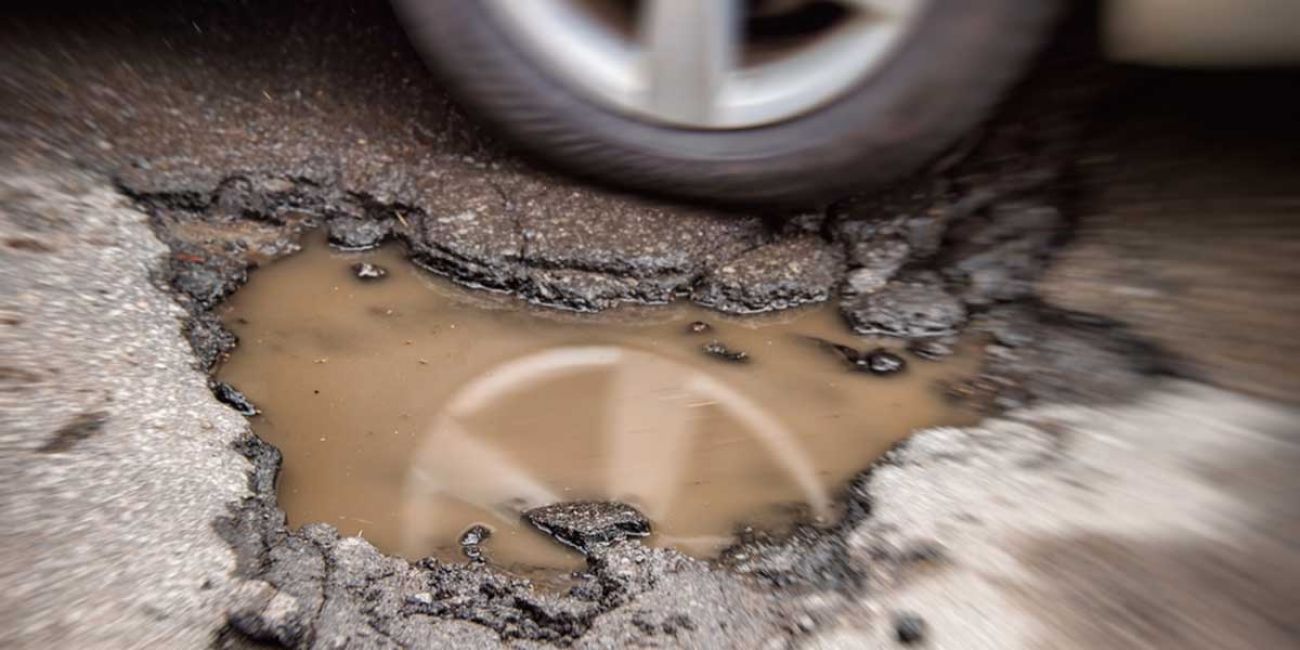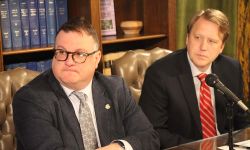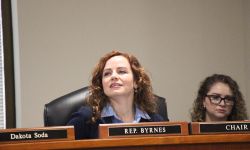Whitmer’s road funding plan could pit Michigan cities against rural areas


Related: Michigan Senate panel rejects Whitmer gas tax, as budget dance continues
To get all of its roads into good or fair shape, Ottawa County would need another $20 million per year for a decade.
That’s money the West Michigan lakeshore county doesn’t have. This year, Ottawa County’s road agency says it will take in $19.4 million for road projects from a mixture of state, county and local funding.
So Ottawa County Road Commission members were pleased by Gov. Gretchen Whitmer’s vow to increase state road funding by $2.5 billion by 2021 — even if they’re undecided about her plan to boost gas taxes by 45 cents per gallon to raise the money, said its spokesman, Alex Doty.
In-person April conferences: Tell us how YOU would fix Michigan’s roads
The tax increase isn’t the only controversy in Whitmer’s roads plan. She also wants to change how money collected from the new taxes is allocated, giving a bigger piece of the pie to urban areas and freeways than to rural and neighborhood roads.
Whitmer’s plan to give more money to the busiest roads would represent a major change to how the state shares road dollars. Public Act 51 of 1951, the law that provides counties and cities dedicated percentages of road dollars, has not seen a wholesale reform since it was adopted.
“Why do we continue to use a formula that’s 68 years old?” Whitmer asked reporters after she presented her first budget to lawmakers in March.
Her changes would only apply to revenue from the 45-cent gas tax increase. Counties and cities still would get their share of the state’s current 26.3-cent, per-gallon gas tax and vehicle registration fees through the Public Act 51 formula.
Under the new plan, Ottawa County, home to Holland and its famed Tulip Time festival, would receive roughly $4.5 million from new gas taxes. Under the current model, it would get $18.9 million, according to estimates from the County Road Association of Michigan.
“We’re not saying that the interstates and those larger roads aren’t important,” Doty said. “But when you look at it, we have hundreds of miles of local and primary roads around here that people drive on every day, from their neighborhood streets to their local county road.
“To say that those aren’t heavily traveled, I think we would disagree with that.”
Over the years, politicians, including former Republican Gov. Rick Snyder, have proposed changing road funding to steer more money to better-traveled roads, but political objections have always defeated the measures.
Whitmer, a Democrat, already faces objections over her proposed gas tax increase and is in for a tough sell to the Republican-led Legislature, with a plan the state budget office acknowledges is less generous to local road agencies and would rank rural roads last in terms of priority.
Whitmer’s goal is to get state trunklines — the freeways and highways owned by the Michigan Department of Transportation — to 90 percent in good and fair condition by 2029.
Chris Kolb, Whitmer’s state budget director, told legislators while outlining the budget the new tax money would be targeted for roads that are “the most economically important roads in our state,” regardless of whether they’re owned by the state or local communities.
“Drivers don’t care who owns the roads,” he said. “They want those roads fixed.”
Related Michigan roads stories:
- If Whitmer’s road funding pitch fails, where is Michigan’s Plan B?
- Gretchen Whitmer’s plan to fix Michigan roads: Nearly triple gas tax
- Michigan roads are a big mess. Here are eight big ideas to fix them.
- Whitmer to Detroit chamber: ‘There is not enough pot to fill the potholes.’
- Ficano: As we fix Michigan’s damn roads, fix the damn funding formula
- State rep: My Michigan roads plan won’t break your pocketbook
- Look to sales tax on gas to help fix Michigan roads, report suggests
- Bipartisan ex-legislators propose gas tax hike to fix Michigan roads
That argument doesn’t wash with Republicans, including state Rep. Triston Cole, who is from Mancelona in Antrim County and opposes Whitmer’s road funding proposal.
“Main county roads up here are equally as important as the main county roads in southern Michigan to the individuals who use them,” said Cole, a past chairman of the House’s transportation committee.
More money to major roads
Today, the state collects gas taxes and vehicle registration fees paid by drivers across Michigan and recirculates them for use on state, county and city roads.
MDOT gets 39 percent of that revenue through Public Act 51. Another 39 percent is split up among the state’s 83 county road agencies. Cities and villages receive the remaining 22 percent.
Under Whitmer’s proposal, more than $2 billion in new gas tax revenue would be dispersed this way:
- Nearly half, 47 percent, to interstate and other freeways — all of which are owned by MDOT.
- 30 percent to “principal arterials,” major routes that aren’t freeways. Many are owned by MDOT, but some are owned by local governments, particularly in urban areas.
- 7 percent each to “minor arterials,” or highly traveled, mostly local roads, and to “major collectors,” almost all of which are owned by local governments and generally connect to neighborhood streets. (Look up examples of principal and minor arterials and major collectors in each of Michigan’s 83 counties, per MDOT.)
- 4 percent to local bridges.
- 3 percent to multimodal transportation, including public transit, rail and mobility.
- 2 percent to “rural economic corridors,” or important rural roads in 78 counties with fewer than 400,000 residents.
All told, MDOT would get 70 percent of the revenue: $1.5 billion when the gas tax increase is phased in by 2021, according to state budget estimates.
Local road agencies operated by counties and cities would receive 27 percent, including $441 million for local road projects in 2021 and $42.7 million for rural corridors.
“There is not one county road agency that comes out ahead” under Whitmer’s proposed model, said Denise Donahue, director of the County Road Association of Michigan.
Donahue said the association included estimates from MDOT in its calculations, which also estimate how much funding county road agencies could receive if the new gas-tax revenue was funneled through the current formula instead. MDOT did not immediately respond to the group’s estimates — and hasn’t publicly revealed how much individual road agencies would receive under the proposal.
“Outstate drivers would clearly be losers, and the urban drivers would be the winners under this proposal,” said Ken Boyer, an economics professor at Michigan State University, who studies transportation funding.
“I’m not sure that (Whitmer’s formula is) going to go anywhere given the history of road-funding battles in the state, but it’s very sensible,” Boyer added.
“The problem with road funding has always been that what we pay to use the roads does not reflect the cost. This is a movement in the right direction.”
Whitmer’s plan also would shift $325 million of the new gas-tax revenue back to cities and counties to be divided under the current formula, an acknowledgement that local road agencies would not see as large of an increase.
“The Act 51 formula is more favorable to locals than the new formula, and so we wanted to hold locals harmless,” state budget spokesman Kurt Weiss told Bridge.
Ed Noyola, deputy director of the County Road Association of Michigan, said there is no reason to change the formula because the current one works. It is calculated to consider population, miles of roads and vehicle registration fees.
“There’s a fair balance within the current Act 51 formula that we feel hits all of those categories, whether you’re an urban county or a rural county,” said Noyola.
His group agrees the state needs $2.5 billion more for roads, but hasn’t taken a position on the gas-tax increase. The association said it’s up to the Legislature and the governor to determine how the money is raised.
A recent report from the nonpartisan Citizens Research Council argues the current formula doesn’t reflect the greatest road needs.
The report noted 69 percent of state roads are in rural areas, yet rural areas account for just 29.8 percent of traffic. That essentially means the current formula treats a two-lane highway in northern Michigan similarly to a six-lane interstate freeway in Wayne County.
But change is hard because tweaking the formula will create winners and losers, said Jordon Newton, a research associate with the Citizens Research Council.
“No one wants to be a loser in that situation,” Newton said.
“How do you convince someone that it’ll be better — even though it’s a little worse for them in the short term — that it’ll be better in the long term? I don’t know that we’ve seen that in the discussion yet.”
What’s the best solution?
As lawmakers weigh the issue, groups as diverse as the Citizens Research Council to the Lansing Regional Chamber of Commerce are increasing calls to change how roads are funded.
The Lansing chamber, which hosted Whitmer at a luncheon last week, isn’t ready to support a 45-cent gas tax increase but thinks it’s the “right time” to revisit Act 51, said Tim Daman, its president and CEO.
“We’re not trying to make this an urban-versus-rural issue,” he said, “although we know it’s quickly going to go there.”
State Sen. Peter Lucido, a Republican from Shelby Township in Macomb County, introduced two bills that would keep gas taxes and vehicle registration fees in the county where they originate.
Lucido, who supports revisiting the local-state funding distribution, said these road-funding decisions are best left to local governments, not the state.
“Let the counties make the disbursements where they feel the roads are the worst,” he said.
Some Democrats, including Senate Minority Leader Jim Ananich of Flint, said they’re willing to wait to talk about how the money is divided until after the state secures enough money to fix the roads.
Lansing Mayor Andy Schor, a former Democratic state representative, said Whitmer’s proposal would put more money toward the capital city’s highly traveled roads and less toward neighborhood streets.
“If this new formula is used, I will be OK with it if it means we get a lot more money to fix all our roads,” Schor told Bridge through a spokeswoman.
He told reporters at a recent news conference that the first priority is to get the $2.5 billion in new revenue adopted, and a conversation on how to split up that money can follow later.
House Speaker Lee Chatfield believes the state’s road-funding problem isn’t the formula, but the state’s policy of charging 6 percent sales tax on gas and spending that money on schools, not roads, spokesman Gideon D’Assandro said.
House Republicans are working on their own plan, but D’Assandro didn’t elaborate on what may be in it.
Chatfield took issue with Whitmer’s distribution model in a recent op-ed in The Detroit News, saying the plan would favor “a small handful of big cities” at the expense of drivers across the state.
“We should not be pitting our cities against our rural communities,” he wrote. “We are one state, and we should have a one-state solution.”
Senate Majority Leader Mike Shirkey, R-Clarklake, meanwhile, “does give the governor props for being creative in distributing funds where they are needed most,” spokeswoman Amber McCann said.
Shirkey is open to talking about changes to the road funding formula, but needs to consider the views of rural lawmakers, McCann said.
“There are going to be those communities that would possibly see a reduction in resources if we change it,” McCann said. “It’s a serious conversation because there’s serious interest in it, but there’s just as many voices who don’t want to touch it at all. It’s going to be a challenge.”
More Michigan roads stories:
- Opinion | Everyone – not just drivers – should pay for Michigan roads
- Opinion | Hell no to Gov. Whitmer’s new taxes, says Sen. Peter Lucido
- Michigan Republicans’ 2019 to do’s: roads and auto insurance
- With flat budget, Gov. Whitmer’s search for Michigan road money gets harder
- Opinion: Want to help Michigan’s poor and middle class? Scrap the gas tax
See what new members are saying about why they donated to Bridge Michigan:
- “In order for this information to be accurate and unbiased it must be underwritten by its readers, not by special interests.” - Larry S.
- “Not many other media sources report on the topics Bridge does.” - Susan B.
- “Your journalism is outstanding and rare these days.” - Mark S.
If you want to ensure the future of nonpartisan, nonprofit Michigan journalism, please become a member today. You, too, will be asked why you donated and maybe we'll feature your quote next time!


